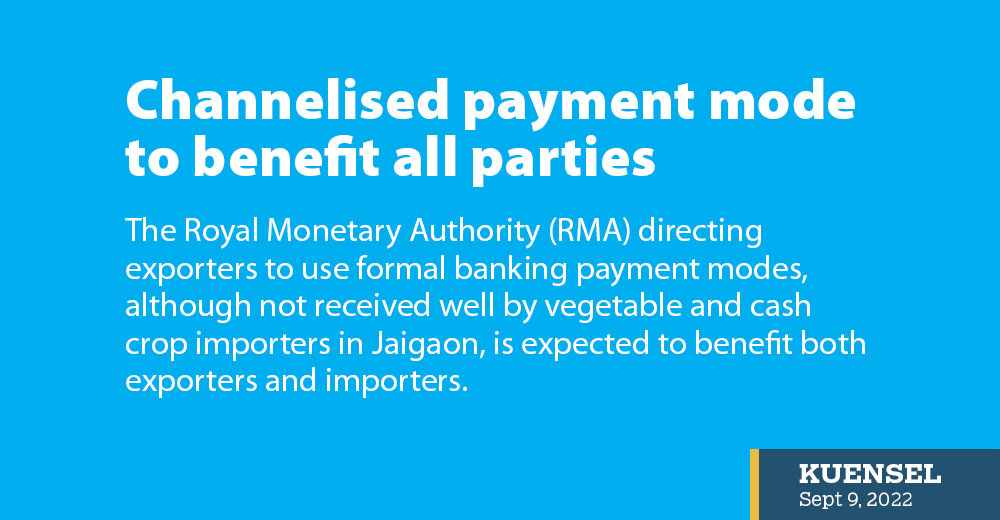Rajesh Rai | Phuentsholing
The Royal Monetary Authority (RMA) directing exporters to use formal banking payment modes, although not received well by vegetable and cash crop importers in Jaigaon, is expected to benefit both exporters and importers.
With the directives, vegetable importers in Jaigaon will have to make payments from banks, which means in Indian Rupees (INR). This, according to observers, should have been implemented a long time ago. As India is the largest trading partner, formal financial transactions are crucial, said one.
In 2021, according to the Bhutan Trade Statistics (BTS), total export to India, excluding electricity, accounted for Nu 26 billion (B). However, banking data shows the export receipts received through the formal banking channel amounted to Nu 21B. This means there is an un-reconciled gap of Nu 5B, which is 19 percent of the total export remittances outside the formal banking channel.
This adversely impacts the INR reserves, maintaining a fixed exchange rate with INR and revenue leakages.
The RMA notification worried Jaigaon importers as many do not use formal banking channels for payment. At present, according to sources, Bhutanese traders export potatoes and other cash crops to vendors in Jaigaon, who then sell the produce to third parties across India.
Although Jaigaon parties are paid in Indian Rupee (INR), they pay Bhutanese in Ngultrum through informal means.
This not only impacts Bhutan but also impacts the Indian taxation system as importers could evade tax.
Further, while Bhutanese exporters receive Ngultrums, the INR remains in Jaigaon. The same untaxed INR is then used for illegal INR-Ngultrum buying and selling, which has depreciated the value of Ngultrum. Today, INR is still sold illegally in Jaigaon at a 4 to 5 percent commission. INR 100 is sold for Nu 104 or 105.
With the formalisation of the payment system, all these will stop, while also providing for the INR reserves. A government official in Phuentsholing said this formalisation is no different to Bhutanese importing vegetables from India and declaring, paying taxes and remitting INR through banks.
“If they don’t want to declare and follow the formal payment system, it means they want to evade tax,” he said. “With valid documentation, banks in India will also assist vendors.”
The official said RMA’s intent will bring reforms in terms of good practice and formal trading between Bhutanese and Jaigaon traders.
Syndicates want to bypass formal channel
On September 3, the RMA directed exporters to maintain trade receipts with the importers across the border in INR through banking channels- as per Section 24 of the Foreign Exchange Rules and Regulations (FERR) 2020. RMA notified that exporters exporting to India must obtain a Bank Export Registration (BER) before processing the export declaration at the customs point of exit starting September 5.
Exporters will then submit a filled BER to their respective banks, following which the banks will endorse the form. Exporters will then submit the endorsed BER form at the customs point of exit for processing the export declaration.
All these procedures will have to be carried out after Bhutanese exporters receive purchase orders from their parties.
Following the RMA announcement, vendors in Jaigaon had syndicated and announced that no one would buy potatoes and other cash crops if payments had to be made through banks. In a hand-written statement, 23 importers have signed and agreed that they will not import potatoes and cash crops starting from September 5.
If any member purchases potatoes in INR or Ngultrum after September 5, the produce will be seized and brought to the committee, the announcement stated. “If the Bhutanese government agrees to accept Ngultrum, the members will arrange a meeting for a decision.”
According to Kuensel sources, three out these 23 individuals, Harendra Prasad, Chanchal Jaiswal and Ashok Shah, who formed the syndicate in Jaigaon are long-time traders listed with the Food Corporation of Bhutan Limited (FCBL). Raju Shah is another individual, who is part of the syndicate but he is not listed with FCBL. They all have been importing vegetables from Bhutan for a long time.
Kuensel learned that these importers pay Ngultrum (cash) and don’t want to agree to the formal channel as they are also alleged to maximise profit from evading taxes and also fear losing the illegal INR-Ngultrum exchange business.
The chief executive officer of FCBL, Naiten Wangchuk, had on several occasions written to the Indian counterparts to formalise the payment system through banks.
“It will be good for all parties involved,” he said.
However, there is no uniformity because there are more private exporters involved, who collude with traders across the border and make payments through informal channels.
Kinley Dorji of Murung Export said he supports the RMA’s decision.
“We wanted this,” he said, adding that channelised payment will guarantee safety, while it also is beneficial to the government.
ST Enterprise’s proprietor said the system will benefit only if it succeeds. “When I export cardamom to Bangladesh, it takes about 26 days to receive the money. I am expecting it may take about a week for us to get the money by selling potatoes to Jaigaon through banking mode. However, farmers ask for immediate cash payment,” he said.
ST Enterprise exported potatoes until September 4. As of yesterday, neither FCBL nor private exporters have stocks to be exported from Phuentsholing. However, with the peak potato season across the country, exporters and farmers seemed to be concerned about this situation.


